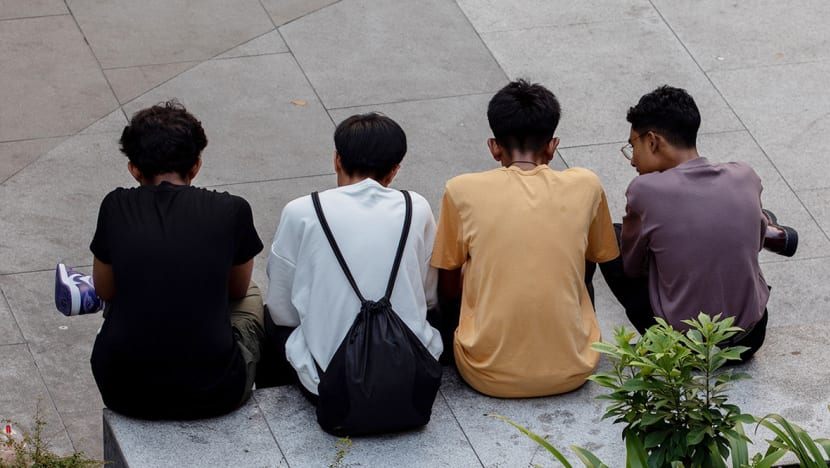How to help youths feel less 'sian'? Less competition, more focus on being decent humans, experts say

SINGAPORE — It is no secret that the youth of today feel quite “sian”, or weary, about the future, marked as it is by climate change, rapid technological advancements that can sometimes seem more harmful than beneficial to society, and a more volatile job market.
To help the young feel more optimistic about their journey into adulthood in such a future, Singapore should try to create a less hyper-competitive society and find ways to value people’s contributions rather than just their personal accomplishments, a panel of experts said.
The panellists were speaking at a forum titled “What is being young like today?” at the Singapore Perspectives 2024 conference on Monday (Jan 22).
The panel — the first in a series of three online forums at Monday’s conference organised by the Institute of Policy Studies (IPS) — presented the latest findings from two nationwide studies on Singaporean youth, which found that the young are not really okay.
The 2022 edition of the National Youth Survey — led by the National Youth Council (NYC) — found that the mental well-being of young people, while recovering from the Covid-19 pandemic, has not returned to pre-pandemic levels.
Four in 10 of respondents in 2022 said that their state of mental well-being was good or very good, compared to more than half (52 per cent) in 2019.
Separately, the Youth Steps survey — done by NYC and the IPS Social Lab — found that transiting from being a student to unemployment reduced a young person's life satisfaction by 14.2 per cent during Covid-19 (2020-2022), almost tripling the 4.6 per cent finding in the years before the pandemic (2017-2019).
Mr Tan Lin Teck, deputy chief executive of the NYC and senior director of the youth division at the Ministry of Culture, Community and Youth (MCCY), said: “We need to appreciate that our youths grow up in a very, very different world.”
He also said that it is important to consider how today’s external forces — such as increased digital connection and rapidly changing business models and technologies — can shape and create young people with a “different outlook or a different demeanour compared to people of the previous generations”.
This can lead to reduced life satisfaction and feelings of ennui or “sian-ness”, the panellists noted.
To combat this, Dr Kwan Jin Yao, assistant professor at the United States-based University of Delaware and research fellow at non-profit The Majurity Trust, suggested three ways where society may help young Singaporeans feel less weary about their future:
- Narrow disparities that have been exacerbated by the pandemic
- Help young people navigate diverse pathways to success
- Achieve stronger outcomes for an already-busy generation while doing less. This includes exploring new ways to support the sandwiched generation, which is squeezed by multiple roles and responsibilities, without introducing new programmes and interventions
WHAT SOCIETY CAN DO
On how this could realistically play out, the panellists — which comprised Mr Tan, Dr Kwan and Associate Professor Vincent Chua, a sociologist from the National University of Singapore (NUS) — said that creating a less hyper-competitive society that values individuals for their contributions and recognises diverse pathways to success can help young people feel less “sian” about their future.
The National Youth Survey found that burnout was among the top five areas plaguing the mental well-being of Singaporean youth. Alluding to this, Assoc Prof Chua noted that burnout is typically “accumulated” and does not “appear out of nowhere”.
“I do wonder whether the burnout among young people could also be due to the over-programming of young people, starting from the earliest days in school, and the hyper-competition that youths are exposed to in schools and so on,” Assoc Prof Chua said.
“Of course, I’m not saying that schools are bad, but ultimately, it hones in on a very singular definition of success that I think seems to permeate society.
“The irony is precisely this: That the enemy of diversity (of multiple pathways to success) is actually hierarchy, because as long as you continue to always be ranking things, there can never be a celebration of all (career) tracks and giving all tracks equal worth.”
To this, he emphasised the importance of celebrating diverse pathways to success, and thinning the inequalities and hierarchies that society had built over time.
One of the ways this can be achieved is by “moving away from hyper-competition to a more community orientation, and a focus on contributions as opposed to winning out the competition and being the first”, he added.
“I think we have to rethink notions of worth, perhaps away from just a singular definition like productivity. I’m not saying it’s not important — of course, it is — but that cannot be the only benchmark for determining the worth of a person."
Cautioning about the dangers of tying a human being’s worth solely to material definitions, Assoc Prof Chua suggested thinking instead of one’s worth in terms of one’s “being” and “humanity”: “Are you a decent person? Do you treat others well? Are you contributing to making people’s lives better?”
Responding to queries from TODAY on what corporations and employers may also do, Assoc Prof Chua said: “More than narrowing wages, they could think in terms of emphasising and practising equal respect to workers.”
This may be in the form of celebrating and showcasing employees’ work or increasing recognition of their contributions, especially as “the work of workers in lower statuses is often rendered invisible”, he suggested.
Asked how employers can encourage a culture of contribution in the workplace, Dr Kwan acknowledged that it could be “inherently difficult”, because the profit motive does not necessarily complement a culture of contribution.
“Nonetheless, at the very least, companies can invest in improving employee productivity through skills upgrading and continuing education, which is mutually beneficial because the companies benefit from the increased productivity while the employees gain the skills and expertise,” he added.
“Additionally, some investment in corporate social responsibility — such as employees being more involved and engaged and companies being more cognisant of environmental, social, and corporate governance — can be a good start, however small the steps may be.”
Employers can also play a part by fostering a culture of contribution, providing developmental opportunities and encouraging employees to tap SkillsFuture for continual learning, said Mr Tan in response to TODAY’s queries.
On the Government's part, the Forward Singapore exercise has also brought together Singaporeans from all walks of life to refresh its aspirations and contribution to the larger society, he added.
“This is the start of a journey to support multiple pathways of success and value the contributions by everyone. The Government has been supporting this effort through initiatives to reduce wage gaps and better recognise ‘hands’ and ‘heart’ jobs, empower individual career planning, and improve matching of jobs and skills,” Mr Tan said.
WHAT INDIVIDUALS CAN DO
Acknowledging that one’s definitions of success may be shaped by different stressors and different interactions, Mr Tan from NYC highlighted the importance of individuals having conversations — with their friends, parents, family and mentors, and in interpersonal relationships — about different pathways to success and the trade-offs that may arise from their choices.
Such conversations can help the young look beyond defining success in terms of the “archetypal Singaporean dream”, and to recognise instead that there are different ways to reach a personal definition of success, he said.
Notwithstanding the trade-offs that would accompany each choice, these conversations can help young people better crystallise their priorities and determine how they perceive themselves and the people around them — whether as competition, or as people to be supported and enabled, he added.
Dr Kwan from the University of Delaware said that these conversations may also shape the way young people approach life, as well as the values and principles that are in turn passed on to their children.
Recalling an incident from his time in junior college when his teacher returned students’ test papers in descending order of their scores, Dr Kwan said that because such practices were centred on trying to foster competition, much of his “unlearning” had to focus on learning to lead a “good life on (his) own terms, without having to benchmark or compare against someone else”.
“It’s not easy to unlearn years and decades of trying to compete and fight, and trying to be better than someone else, but I think a big part of it for individuals will be about having these conversations among ourselves,” he added.
“How do we have conversations about what it means to have a good life? How do we not give ourselves to subtle pressures of what it means to be successful?”















